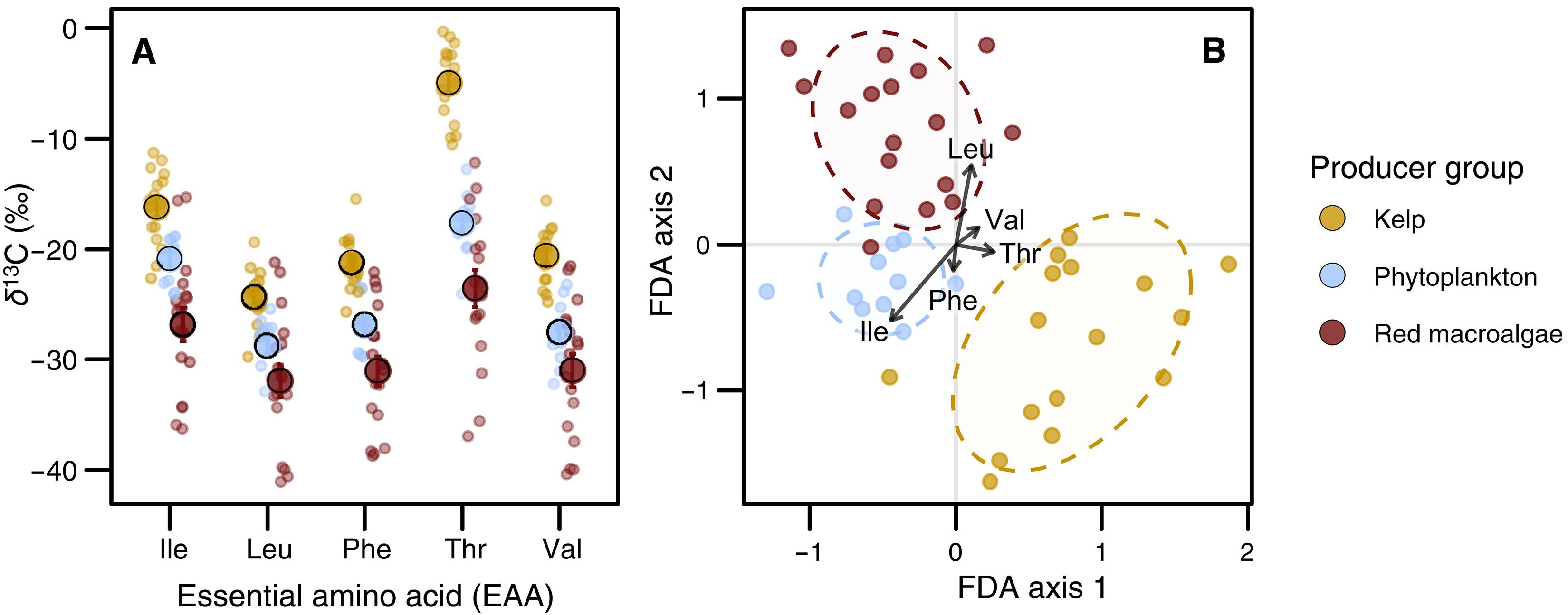在快速变暖的生态系统中,海带森林的消失和草皮藻类的出现重塑了捕食者的能量流
IF 12.5
1区 综合性期刊
Q1 MULTIDISCIPLINARY SCIENCES
引用次数: 0
摘要
气候变化正在摧毁世界各地生态系统中形成栖息地的物种。然而,对于包括冷水海带森林在内的许多标志性生态系统来说,栖息地丧失对更广泛食物网能量学的影响仍不确定。在这里,我们评估了缅因湾海带森林的消失和随后低洼草皮藻类的增殖如何改变了掠食性珊瑚鱼的营养生态位和获得的能量。体积组织δ13C和δ15N分析表明,海带林内鱼类的营养生态位比草皮礁大,种间生态位分离也更明显。此外,必需氨基酸的δ13C分析表明,海带来源的能量占海带森林鱼类消耗的大部分能量(>;平均50%),而草皮珊瑚礁上的鱼类通过更多地依赖以浮游植物为基础的能量通道来补偿海带的减少。因此,生态系统状态向草皮藻类的转变可能对食物网的能量学和恢复力产生深远的影响。本文章由计算机程序翻译,如有差异,请以英文原文为准。

Kelp forest loss and emergence of turf algae reshapes energy flow to predators in a rapidly warming ecosystem
Climate change is decimating habitat-forming species in ecosystems around the world. Yet, the impacts of habitat loss on the energetics of the wider food web remain uncertain for many iconic ecosystems, including cold-water kelp forests. Here, we assessed how the loss of kelp forests and the subsequent proliferation of low-lying turf algae in the Gulf of Maine have altered the trophic niches of, and energy acquired by, predatory reef fishes. Bulk tissue δ13C and δ15N analysis showed that fishes in kelp forests had larger trophic niches and greater interspecific niche separation than fishes on turf reefs. Moreover, δ13C analysis of essential amino acids revealed that kelp-derived energy accounted for most of the energy used by kelp forest fishes (> 50% on average), whereas fishes on turf reefs compensated for kelp decline via greater reliance on a phytoplankton-based energy channel. Therefore, ecosystem state shifts to turf algae—now a global phenomenon—may have far-reaching impacts on food web energetics and resilience.
求助全文
通过发布文献求助,成功后即可免费获取论文全文。
去求助
来源期刊

Science Advances
综合性期刊-综合性期刊
CiteScore
21.40
自引率
1.50%
发文量
1937
审稿时长
29 weeks
期刊介绍:
Science Advances, an open-access journal by AAAS, publishes impactful research in diverse scientific areas. It aims for fair, fast, and expert peer review, providing freely accessible research to readers. Led by distinguished scientists, the journal supports AAAS's mission by extending Science magazine's capacity to identify and promote significant advances. Evolving digital publishing technologies play a crucial role in advancing AAAS's global mission for science communication and benefitting humankind.
 求助内容:
求助内容: 应助结果提醒方式:
应助结果提醒方式:


